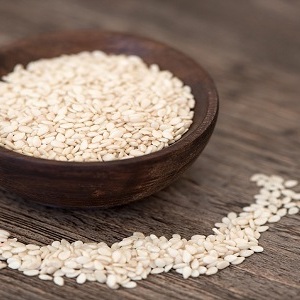Sesame seeds or ‘til’ as they are known in many parts of India, may be tiny, but they pack quite a big punch of nutrients.
[the_ad id=”13371″]
These oil-rich seeds are found in the pods of the sesamum indicum plant which are native to India. They are some of the oldest plants and oilseeds known to us. Sesame seeds are popular during celebrations of the harvest festival Makar Sankranti, which typically occurs in the cold season in January and they are associated with longevity and prosperity.
There is good reason why sesame seeds are consumed during winter, one of the main reasons being they are rich in good fats which are naturally warming. Sesame seeds are also packed with nutrients such as protein, zinc, copper, calcium, vitamins, anti-oxidants and fibre.
Let’s take a closer look at some of the health benefits of sesame seeds:
They are rich in protein:
Sesame seeds are rich in plant protein and are therefore a great ingredient for vegetarians. In a 30-gram serving of sesame seeds, you can get approximately 5 grams of protein. To get the maximum benefit out of sesame seeds, opt for the hulled seeds, since the hulling and roasting processes reduce oxalates and phytates which inhibit the digestion and absorption of protein. Sesame seeds are also a good source of the amino acids, methionine and cysteine.
They are a good source of fibre:
Fibre is important for maintaining a healthy digestive system. During the cold winter season, constipation is a common issue. This is why consuming sesame seeds is popular during winter, not only because they are high in fibre, but also because they contain a good amount of unsaturated fatty acids which relieve constipation.
They are nutrient rich:
Sesame seeds contain an abundance of nutrients, such as B vitamins – Thiamine (B1), Niacin (B3) and Vitamin B6. They are also rich in antioxidants which help to fight off the oxidative stress and free radicals that cause damage to cells. Sesame seeds are also a good source of calcium that promotes bone health.
They are heart-healthy:
Sesame seeds contain plant compounds such as lignans and phytosterols which are known to lower cholesterol and triglyceride levels. Sesame seeds are also a good source of magnesium which can help to reduce blood pressure. Additionally, the Vitamin E, lignans and antioxidants found in sesame seeds may prevent the buildup of plaque in the arteries, therefore helping to maintain a healthy blood pressure.
They help fight inflammation:
Sesame seeds are rich in nutrients such as Vitamin B6, Zinc, Iron and Selenium, which can help fight inflammation. These nutrients help to reduce inflammatory markers and are therefore beneficial in combatting conditions such as arthritis, heart disease, diabetes and cancer.
They boost immune system:
Being rich in zinc, copper, iron, selenium, Vitamin E and phytosterols – sesame seeds can help you strengthen your immune system and can help to keep infections and diseases such as colds and flu at bay.
There are so many amazing benefits to the tiny sesame seeds and the winter months are the best time to enjoy them. So, this Sankranti, don’t hesitate to reach for ‘til-gul’ wadi and sesame seed laddoos – they are tasty and healthy too!
Source:

Sudha Joshi Betarbet
Health Editor
